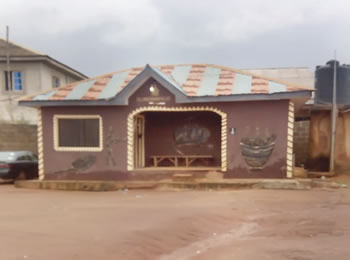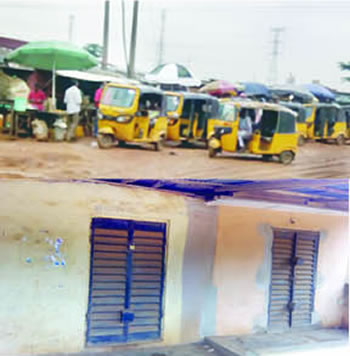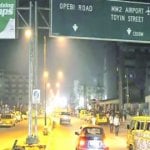In the aftermath of a series of militant activities in Ogijo, PAUL OMOROGBE visited the affected areas to assess the state of livelihood of those who had the courage to return. His report.
Ogijo, a town in Sagamu Local Government Area of Ogun State, is situated between two more popular areas: Ikorodu in Lagos and Sagamu in Ogun State. However, it is closer to Ikorodu than Sagamu. It is easy to ‘travel’ to Lagos from Ogijo. You could take a motorbike or tricycle for N100 and end up in Ikorodu Garage, as the bus stop is called.
The area gained notoriety when hoodlums suspected to be militants had terrorised the communities for almost two months, killing many people while property were looted.
But a joint military operation involving men of the Nigerian Army, Nigerian Navy, Department of State Services, police and Nigeria Security and Civil Defence Corps brought the situation under control.
According to reports, no fewer than 120 militants were killed during the operation which included air strikes.
Perhaps because of its contiguity to Lagos, the level of commercial activities in this Ogun community is interestingly high. Specifically, at Ita-Oluwo, the junction leading into the area where the attacks took place, there is intense human and vehicular movement with scores of shops and business around this spot giving at semblance of a typical bus stop in Lagos.
From this point, there are mostly motorbikes that take pedestrians to their houses at sections called Imushin, Oke-Imuti, Elepete Phase 1,2 and 3, Igbo Olomu, and others like Ola Imam. These are the communities that make the area beyond Ita Oluwo. The road that leads to these areas is an earth road.
It was a rainy day when the Nigerian Tribune visited and on such days, bike men have a filled day charging higher fares than they would when the skies are clear. On such days as this one, the entire stretch of the road which is several hundreds of metres long is terribly muddy. It takes special dexterity to ride through the road on a bike without falling or getting stuck in deep, thick muddy pools, perhaps the reason the bike men feel a higher fare is necessary for knowing how to successfully navigate through them all.
On both sides of the road that leads to the once troubled areas, are schools, churches, shops and what can be described as mini-shopping complexes.
Persons Nigerian Tribune spoke to all through the journey from Ogijo motor park to Ita-Oluwo and into the affected areas all agreed that there was peace and a number of residents had returned the areas all around; thanks to the presence of security agents in the area. Nigerian Tribune gathered that a strong contingent of soldiers numbering up to 200 had occupied the areas, especially the interior deep within where the bunkering had taken place.
Though some residences around Oke-Imuti were occupied, areas further down like Elepete were no go areas for now as the army was said to have requested for three more months to do a thorough clean up as some miscreants could still be lurking around the area.
Mrs Idowu Akanbi was seen sitting alone in her hairdressing salon, with a couple of her little children playing around. She said that though there was peace which she was grateful for, the same could not be said for business patronage, because the returnees were the landlords with nowhere else to go, while the tenants had left. “Business is no more like before,” she said. “People have returned but it is we the landlords. We can’t carry our houses away from here. The tenants have left. Because of this the people are not much and my business has gone down.”
According to her, not only had business taken a lull, religious activities had changed for both Christians and Muslims in the area. “There are no vigils like there used to be in the churches and the mosques don’t hold big programmes as before.”
The attacks had also taken their toll on education for children in the community. “Schools had to close and most could not hold the third term examinations all this while. I do know of one that opened recently just to conduct the third term examinations for its students,” she said.
Mrs Oremade Olayinka who runs a provision store had a similar tale of business downturn to tell. But unlike Mrs Akanbi, her losses began the moment the fracas took place. “There were people that usually buy now and pay later who were owing me. Where are they now? They ran away because of the trouble and left with my money.”
She said it was double jeopardy for her as she also could no longer get goods without paying immediately as her Igbo suppliers were not only facing the same low patronage, but had their stores looted when the trouble was on.
“All around me the situation is the same. Look at this man beside me, he is going home already before 4pm. I who used to open at 7.30am, I came 10am today. I close between 5.30pm and 6pm unlike before the incident when I closed at 8pm. There has been no business since the attack happened. What I do is that I resume here every day, so that I can have somewhere to go to each day. The cement shop opposite me has closed and that woman you see over there in that shop opposite me used to live with us in this area, but she has moved out. It is people who have money that can move out, I don’t!”
Lamenting the situation further, she said with no returns coming from sales, she and her children began to feed on the stock in her shop to survive. “Even my husband who works in Abeokuta has not been here to see us ever since the attacks occurred. This road you see here used to be busy with many school children and workers passing by that patronized me, but all that has changed since.”
When Nigerian Tribune visited his barber shop by the main road, Emmanuel Obembe was on his way out. “I thought you wanted something that was why I waited a bit,” he said. Obembe lives in the Oke-Muti area where his shop is, just like Mrs Akanbi and Olayinka. “ We wake up and sleep normally but business is not as usual because people have moved out. Our prayer is that they return so that things can be normal again,” he told Nigerian Tribune before kicking his motorcycle and zooming off.
All over the community, though normalcy has returned and those who can have opened for business, the story off low patronage pervades.
Nigerian Tribune visited the traditional ruler at his Olumushen mini-palace, he and his chiefs were said to be away for an important meeting. However, a man, Sakiru Ajibola, who described himself as a relative to the oba, said the community had remained peaceful because of the security operatives present, noting that people were gradually returning to their homes.
This was the optimistic view he shared just like Mrs Olayinka who also noted, “I hope that those people who left and are selling their houses will not regret it when this place becomes much better in the future.”







